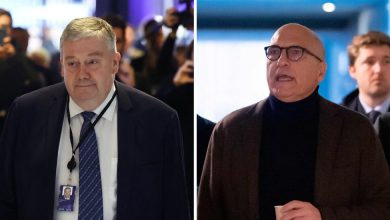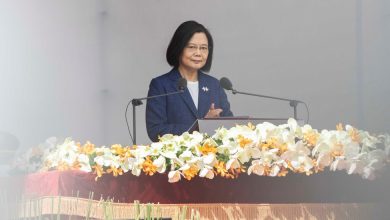The Biennial World Cup May Be Dead, but FIFA’s Fight Isn’t Over

DOHA, Qatar — Gianni Infantino strode into the bright lights of a packed convention center alongside the emir of Qatar on Friday and declared that he expected this year’s World Cup to be the best ever. It was not an unusual boast; Infantino has made it before, in Russia in 2018, and he will surely make it again when the tournament heads to North America in 2026. But behind his beaming smile, and his bombastic words, the trip to the desert had been the setting for the FIFA president’s latest disappointment.
It was here where yet another of Infantino’s hopes for revolutionary change, the kind of bold but ultimately failed plan that has marked his presidency of soccer’s global governing body, finally came to an end. The divisive efforts to double the frequency of the men’s World Cup, to milk FIFA’s multibillion-dollar cash cow every two years instead of every four, are over.
While Infantino reminded FIFA’s members, gathered together in person for the first time in three years, that the idea of a biennial World Cup had not been his — a claim that was technically accurate — he had spent a significant amount of financial and political capital to try to engineer what would have amounted to one of the most significant changes in soccer history. Polls were commissioned to showcase support. Experts were enlisted to push back against critics. But the concept’s opponents never wavered: By last fall, European and South American soccer leaders were already threatening a boycott if it came to fruition.
In Doha, Infantino finally raised the white flag.
The reversal, yet another capitulation on yet another of his grand ideas, followed earlier blunders that have led to damaging rifts with important constituencies. In 2018, Infantino tried to force through a $25 billion deal with the Japanese conglomerate SoftBank to sell some of FIFA’s top assets and create new club and national team competitions, provoking a fight so bitter that he and the leader of European soccer did not speak for a year.
In 2019, FIFA used back-channel efforts to try to expand this year’s World Cup to 48 teams from its planned 32. The proposal was abandoned because it would have required the host, Qatar, to share games with its neighbors, including a group that was then engaged in a prolonged economic blockade of the tiny Gulf nation.
Last week, Infantino, 52, could not quite bring himself to say explicitly that the biennial World Cup, the source of so much acrimony over the past year, was not going to happen. Instead, he allowed only that it was now time to “find agreements and compromises.”
FIFA, he told delegates, needed new competitions, the kind that would produces the type of revenues needed to fulfill the promises FIFA has made to its 211 member federations. No FIFA president has been generous as Infantino, and for him follow-through is suddenly vital: He announced on Thursday that he would stand for re-election next year.
Plans for future events are already taking shape. Annual competitions for boys and girls are planned, with a 48-team youth event for boys and 24-team girls competition unlikely to face any opposition. And opposition to an expanded Club World Cup to be played every four years — another Infantino priority — is now surprisingly muted. A 24-team Club World Cup had been awarded to China for 2021 but was scrapped because of the coronavirus pandemic and then sidelined altogether as Infantino focused his energies on the biennial World Cup.
Now, with even once-reticent European officials engaging in positive talks, the Club World Cup — potentially expanded even more, to 32 teams — is likely to be agreed upon in the next few months. The new event could begin as soon as 2025. Or it could be delayed until 2027 should FIFA, in the face of resilient European opposition, find an alternative national team competition to the biennial World Cup. Some regional bodies, including Concacaf, the group responsible for soccer in North and Central America, are still pushing for a major new national-team competition.
“I think the appetite is there for change, and I think the rest of the world really wants change,” said the Concacaf president, Victor Montagliani.
Montagliani suggested a revived and expanded version of the mothballed Confederations Cup, a largely unpopular tournament held in World Cup host countries as a test event, might be an option, as could a global Nations League that could feed into a new quadrennial event for its regional winners — an idea some Europeans ridiculed as a biennial World Cup “by the back door.”
At the heart of much of the tension, though, remains a bigger fight: the battle for supremacy between European soccer and FIFA. European officials have been angered by what they perceive as efforts by Infantino, a former UEFA general secretary, to diminish Europe in an effort to bolster his popularity around the world, and signs of their rift were clear in Qatar last week. Several members of UEFA’s delegation, for example, including its president, Aleksander Ceferin, were notable by their absence at Friday’s World Cup draw, an event that took place only a day after they had taken part in the FIFA Congress.
Infantino has talked openly about breaking Europe’s stranglehold on success — FIFA last year appeared to encourage efforts to found a breakaway European Super League before walking away from the project as it collapsed — and he retains important allies who share his concerns about its dominance.
“What are the rest of us supposed to do? Just twiddle our thumbs and send players and capital over to Europe?” said Montagliani, a Canadian. “That can’t happen. I’m sorry. The reality is, they have as much of a fiduciary duty in terms of the rest of the world, and I think it is time that we all get around the table figure that out.”
The now-doomed biennial World Cup campaign saw Infantino bring other allies into the fight, including leveraging popular former players and coaches to press the issue on his behalf. The efforts were led by Arsène Wenger, the former Arsenal coach, who toured the world espousing the benefits of the competition, and members of the FIFA Legends program, a FIFA-funded group of former international stars, who also offered glowing reviews. (Current players were by and large opposed to the idea.)
At the same time, opinion polls and surveys and public relations consultants were tasked with changing minds of a skeptical news media and wary fan groups. In the end, though, the effort produced only disruption and discord. And it does not appear to have been cheap: FIFA last week reported a spike in its communications costs in its latest financial disclosure. They rose by almost $10 million — 62 percent — compared with the previous year.
Now, as he pushes ahead and makes promises for his re-election, some are waiting for, even expecting, Infantino’s next big idea, one that could deliver cash to his constituents and also the legacy as a change-maker that he craves.





